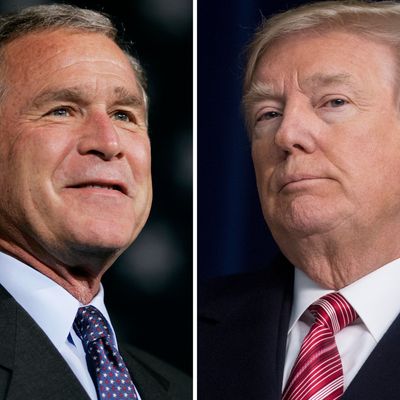
When I was a much younger political junkie, a term you heard a lot was the “Republican Electoral College Lock.” E.J. Dionne explained it in 1988:
In the last five elections, 23 states with 202 electoral votes (out of the 270 needed to win) have voted Republican every time. In those elections, Republicans have won a total of 2,075 electoral votes, the Democrats a mere 567.
That year Republicans expanded their electoral vote lead since 1968 to a 2,501 to 678 margin (though two states, Iowa and Oregon, voted Democratic for the first time since 1964, a sign of shifting tectonic plates to come). But the more fundamental idea was that Republicans were regularly putting together a coalition of states that left them with a much shorter path to the finish line than Democrats had.
The “Republican Electoral Vote Lock” was rudely interrupted by Bill Clinton’s two wins, and put to rest for all time with Barack Obama’s two wins. But Democrats have quietly put together a streak of their own, as Ron Brownstein explains:
If Joe Biden maintains his steady lead in national polls over President Donald Trump through Election Day, Democrats will win the popular vote for the seventh time in the past eight presidential elections – something no party has achieved since the formation of the modern American political system in 1828….
Since…1828, no party has won the popular vote more than six times over any eight-election sequence. Democrats did that from the 1820s to the 1850s, Republicans did it from the 1890s to the 1920s and Democrats managed the feat again from the 1930s to the 1960s. Viewed from another angle, no party has previously won seven popular-vote victories in fewer than nine presidential elections (as Democrats did from 1824 to 1856, Republicans from 1896 to 1928 and Democrats from 1932 to 1964).
Republicans, of course, have won the presidency twice in this century while losing the popular vote. That only happened three times in the previous 211 years.
Since Trump’s strategy assumes another Electoral College win combined with a popular vote loss, a record- a record-breaking Democratic streak is, well, nearly a lock. And unless the Republican Party gets serious about expanding its narrow coalition to include nonwhite voters and urban areas, its presidential candidates will likely to continue to rely on an Electoral College advantage to win the presidency – until they lose and are forced to change.
But unfortunately, they have another, sinister option: hanging onto power by strengthening the institutions – not just the electoral college, but the U.S. Senate, the states, the federal courts – that allow for minority rule. And they can also continue to thwart popular majorities by building rather than filling potholes on the path to the ballot box. Brownstein quotes Republican heretic Geoffrey Kabaservice on this point:
The Republican appetite for vote suppression ultimately springs from the lack of confidence in the popular appeal of its ideas. Otherwise you wouldn’t need to do that. … I think the party has not just given up on ever winning majority status, it has given up on trying to persuade people who are not already in the camp.
As for Democrats, they can continue to agitate for a constitutional amendment abolishing the Electoral College or some scheme to neutralize it (e.g. the National Popular Vote Initiative, an interstate compact whereby states pledge to cast their electoral voters for the national popular vote winner); the former would take many years and the latter could be challenged in court as unconstitutional. The surest route to protection of minority rights is probably via voting rights activism, assuming Democrats win both Congress and the White House this year, says Brownstein:
[M]ost observers consider it more likely that a unified Democratic government would pursue the election agenda the House passed in 2019 – and that former President Barack Obama recently endorsed in his eulogy for Rep. John Lewis. That would include approving a new Voting Rights Act, measures to ease registration and access to voting, limits on gerrymandering of congressional districts, constraints on unregulated political spending and potentially making the District of Columbia and Puerto Rico new states. (The House has already voted for DC statehood but has not addressed Puerto Rico.)
A trifecta Democratic government would also at least seriously consider abolition of the legislative filibuster, a goal Obama endorsed in those same remarks at Lewis’s funeral.
At some point the Democratic popular majority is going to reject being regularly consigned to the tender mercies of a GOP minority that’s mostly interested in fighting to protect its illicit power. And then you’ll see some Democratic radicalism for real.






























